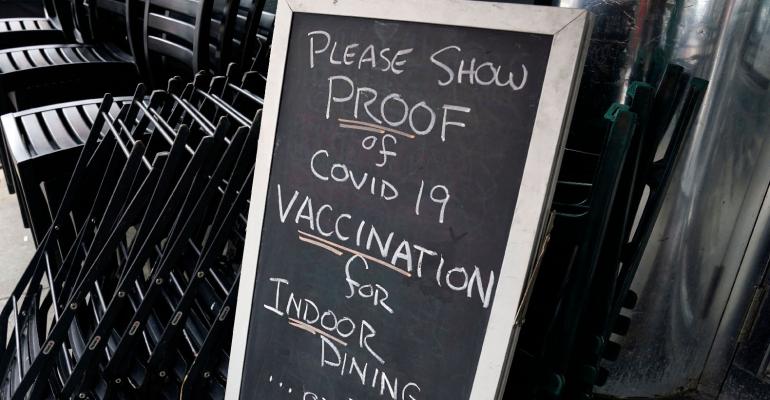Nancy, I hate to be the bearer of bad news, but I think COVID’s going to be with us forever. We, the human species, failed to stop it in time or to get the global population vaccinated enough to prevent it from mutating into the more contagious delta variant, and there will very likely be an epsilon variant. And then variants named zeta, eta, theta, iota and on through the Greek alphabet.
And we’ll develop new vaccines that work against the new variants and we’ll get boosters periodically, just like we get annual flu shots and periodic tetanus boosters. And humanity will go on.
But in order to get things back to relative normal as quickly as possible, more people need to be vaccinated.
In many countries, the delay in vaccinations has been due to the logistics of approving vaccines, getting enough doses and distributing them, but in the United States it’s good old American ignorance.
 Because vaccines are miraculous. They’re why we aren’t regularly dropping dead from smallpox or polio or many other diseases that we’ve nearly completely prevented or even driven to outright extinction.
Because vaccines are miraculous. They’re why we aren’t regularly dropping dead from smallpox or polio or many other diseases that we’ve nearly completely prevented or even driven to outright extinction.
Nancy, I had a nearly complete lack of patience for people who were opposed to the time-tested science of vaccines back when the measles was the problem. Now I’m just beside myself, and I find that I’m completely without sympathy when I hear stories of unvaccinated adults who get seriously ill, or worse, from COVID. The vaccines have been readily available to the general public for months now. If you don’t have the time, the common sense or the sense of civic duty to take a simple injection, well, my reserve of sympathy for you is empty, especially since you’re endangering people who are under the age of 12 or who for legitimate medical reasons can’t get vaccinated.
I thought maybe this was a personal pandemic-era glitch on my part — that the emotionally exhausting past 18 months have triggered a new cold-heartedness in me — but I’ve spoken to friends and colleagues about this, and much to my surprise and regardless of their political affiliations (although most of them are here in the Northeast), they pretty much feel the same way.
Except for a local chef who is outraged at new regulations here in New York City that require bar and restaurant operators (and operators of gyms and entertainment venues) to require proof of vaccination to let guests in.
Those requirements, and similar ones in other jurisdictions, such as Berkeley, Calif., Honolulu, New Orleans and San Francisco — and probably Los Angeles by the time this story is published — are the sticks directed at the unvaccinated who were not induced by the carrots of free doughnuts, discounts, paid time off or, in the case of New York City residents, cash money in the form of $100 debit cards.
My chef friend asks, what is the point of stigmatizing unvaccinated people? Won’t it just harden their resolve?
After all, if you call someone stupid or lazy or selfish, they’re probably not going to listen to anything else you have to say, and that, he argues, is what the vaccine mandates imply of those who haven’t been immunized.
He’s still enforcing the requirement, with apologies and occasional expletives criticizing local government — something pretty much all New Yorkers can get behind — even though the law won’t be enforced by local authorities until Sept. 13.
Other operators clearly disagree with my chef friend. José Andrés’s ThinkFoodGroup, based in Washington, D.C., and Danny Meyer’s Union Square Hospitality Group, here in New York City, are among a growing number of operators who, citing a desire to keep their staff and customers as safe as possible, are only letting vaccinated customers sit in their dining rooms.
Several bars in my Brooklyn, N.Y., neighborhood started requiring them even before the citywide mandate was announced.
Many restaurants large and small have also switched from carrot to stick to get their workers vaccinated: Employees must either get vaccinated or become former employees (or in some cases get tested for COVID with annoying frequency).
Then again, other states, including Texas and Florida, have passed regulations forbidding restaurants from banning the unvaccinated. Some Texas restaurants have resisted — they want their customers to be vaccinated — and Texas Governor Greg Abbott reminded operators that the state could rescind their liquor licenses if they don’t comply with that rule.
Talk about a stick.
So, once again, restaurants are at the front lines of a cultural and political conflict.
In some jurisdictions, the decisions have been made for them: They have to require proof of vaccination in some places, and they can’t ask in others. But in most of the country operators have a choice, and it’s not an easy one. How do you balance protecting your staff and guests with also risking alienating them?
According to the latest medical updates, the delta variant can be spread by the vaccinated as well as the unvaccinated, although probably not as easily by vaccinated people, so as in pretty much everything in life there are no guarantees, but I’m curious to know what your take is on this, Nancy. What do you think restaurateurs need to consider as they face the difficult issue of requiring proof of vaccination for customers or, for that matter, their own staff?
 Nancy Kruse responds:
Nancy Kruse responds:
I’ll start out, Bret, by congratulating you on your command of the Greek alphabet. It appears to be one of the few entities insulated from COVID-19 vaccination controversy, unless or until the Greek government calls and demands their letters back. Its belated embrace as a neutral means of naming the virus variants clearly reflects the influence of partisan politics, rampant misinformation and social media that have combined to fuel the crisis.
Partisan politics have replaced any semblance of a unified, let’s-all-pull-together effort. It is wearying and distressing, and neither side has cornered the market on bad behavior. Both have jettisoned political principles to score political points while the pandemic rages. Your description of Republican Governor Greg Abbott’s threat to rescind liquor licenses of restaurants that demand proof of vaccination is apparently being matched in Democratic California, where an investigation has been launched by, yes, the Department of Alcoholic Beverage Control against the Basilico’s Pasta e Vino in Huntington Beach. You’ll recall that Basilico’s owner, Tony Roman, is the guy who has garnered buckets of publicity for the sign over his door that reads “Proof of being UNvaccinated required.” The reason for the investigation per the Washington Post: A so-far unspecified complaint dating back to July 2020.
Rampant misinformation has also characterized this infernal plague from the get-go, and neither our government nor our public health authorities have been able to squelch its spread. The early intelligence vacuum at the top has given rise to no end of dis-, mis- and anti-information.
It’s a myth, for example, that the vaccine was dreamt up overnight in some seat-of-the-pants, slapdash fashion. Newsletters from Johns Hopkins and Nebraska Medicine and multiple major newspapers have reported that, while SARS-CoV-2, the virus that causes COVID-19, is a new variant, it belongs to a family of coronaviruses that scientists have studied for more than 50 years. When it appeared, they had a pretty good idea of what they were dealing with and were able to plug into pre-existing processes used to create other vaccines. The requisite large-scale trials were ramped up expeditiously by using networks established in the pursuit of an HIV vaccine, and they could use pre-built manufacturing facilities that were already in place for production.
In other words, Bret, the vaccines successfully marshalled 21st-century technology and scientific smarts, and I suspect that at some point in the future we will look back on their development as a real medical triumph and regard its creators as heroes.
Virus-related stories and rumors of all stripes have been spread at the speed of light by unfettered social media. This summer, The New York Times ran a story on “The Most Influential Spreader of Coronavirus Misinformation Online” that talked about Joseph Mercola, an osteopathic physician in Cape Coral, Fla., who has reaped more than $100 million for his digital anti-vaccination screeds.
He is a kind of anti-Fauci, a counterbalance to Anthony Fauci, the omnipresent chief medical advisor to the President and director of the National Institute of Allergy and Infectious Diseases. They represent the two sides of this divisive debate yelling across a chasm, while the exasperated populace wonders whom to believe.
Let me cut to the chase here, Bret, because I agree with you. Restaurants have once again been dragged into a raging controversy that is not of their making, but which profoundly impacts their businesses. A National Restaurant Association survey conducted in late August revealed that 60% of adults had changed their restaurant behaviors because of the delta variant, with nearly 20% saying they had stopped going out to restaurants.
There are, however, some things that operators can do to help themselves. For some, this may include wielding a much bigger stick. Business Insider recently ran a story on Alvarez & Marsal, a blue-chip corporate-turnaround specialist, that will require all employees to provide proof of vaccination by September 7. Laggards will have 75 days to get the jab or be placed on unpaid leave. Unpaid leave is the kind of tough stuff that BI predicts will be adopted by more employers, especially since the Food & Drug Administration has given full approval to Pfizer vaccine.
If and when they require proof of vaccination, restaurateurs will need to prepare for blowback from some consumers, which they can ameliorate by following the common-sense approach laid out a few weeks back in the Nation’s Restaurant News article, “Here’s How Restaurants Can Prepare for Vaccination Mandates.”
It recommends actionable steps including clear communication of vaccine requirements both inside and outside the restaurant, staff training to identify patron vaccination status, and, importantly, how to deal with belligerent customers.
As an aside on the subject of clear communication, I was struck by the announcement in late July from Argosy, a popular East Atlanta restaurant and bar, that it would begin requiring patrons to be vaccinated. This came on the heels of yet another shutdown, as four members of the restaurant’s fully-vaccinated staff tested positive for the virus. Said owner Armando Celentano, “I have to do what I think is right to protect the people who rely on me to make a living.” This kind of straight talk, devoid of overheated rhetoric, may help depoliticize the issue and, critically, reassure employees.
As we saw operators pivot during the first wave of the pandemic to open their kitchens and hearts to those in need by feeding their staffs, neighbors and first responders, we’re seeing some step up to assist in vaccination efforts. Harlem’s iconic Melba’s Restaurant recently opened a mobile vaccination site for patrons and the public at large. The launch was attended by whole passel of music and media celebs, chefs and influencers, all looking to gin up awareness and drive consumers to the site. An added bonus: the first 100 participants received a Grandma Mae’s Sweet Potato Pie gratis. That’s one sweet deal, Bret, and my idea of a truly compelling carrot.
Contact Bret Thorn at [email protected]
Follow him on Twitter: @foodwriterdiary
Nancy Kruse, president of the Kruse Company, is a menu trends analyst based in Atlanta and a regular contributor to Nation’s Restaurant News.
E-mail her at [email protected]





